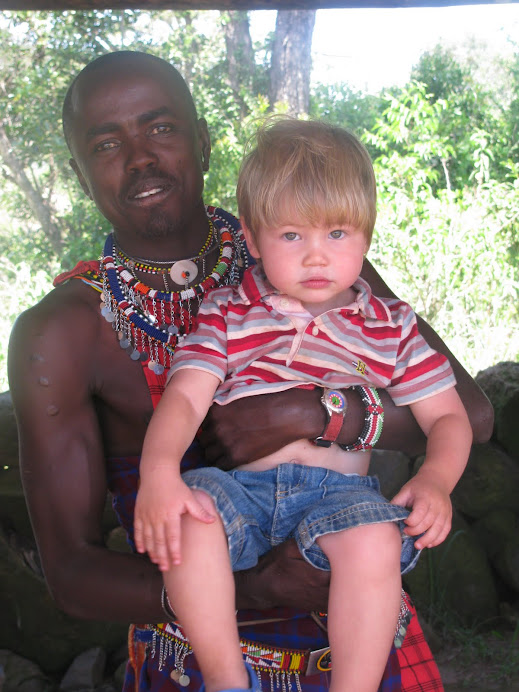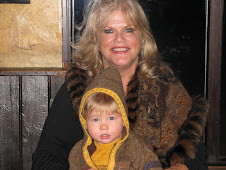Our first week back in Kenya, our first week of living here for the foreseeable future. Wild, to say the least. Tiger has taken to the wide open spaces, the lush, tropical, desert gardenscape of Karen, the ex-pat community in which we’re living, like dust to a bunny. If I had any doubts about moving here, they all vanished on Saturday watching him “make rake” with the gardener, Philip, around an overflowing jacaranda tree. (The blossoms are a heady purple.) My son has made fast friends already with the crew who manage the grounds and oversee the comings and goings of the main house and our little cottage.
The first couple of days, I felt assaulted somewhat by the plainness, the dirtiness, the richness, the colors and washed-outness; by the starving cattle in the middle of the main roads; by the dark, open, hopeful faces walking the long way home; by the brick-red earth that gapes and gulleys seemingly everywhere. Such rawness all around. And, going back to my Irish roots, I wondered about how our frailties might be reflected, altogether kindly, in the color of our skin. Darkness is the strength of black blood; white lies become the blossoming of truth; brown belongs to the giving earth; pink peril means newborn; and yellow is a fever that opens doors. That’s where I am right now, caught between overwhelming obligation to myself, my son, my new home, and a giddiness of adventure and hilarity that startles me.
On a lighter note – and there’s plenty of that – Tiger is in pre-school two mornings a week at Stepping Stones, where his girlfriend, two-and-a-half-year-old Zoe Rose, also attends. (She is the beauteous daughter of my good friends, Lisa and Niklas, who, along with Lisa’s mother, are guilty of getting us to relocate here from Dublin.) I’m thinking about enrolling him in one of their special offerings, Monkeynastics, just because it sounds like the way we live. Joseph, our driver and erstwhile Jack-of-all-trades, is helping us to settle in on every front. I’m hiring a fabulous nanny tonight whose laugh is merrier than any I’ve ever heard.
In the evenings, we sit on the porch, an old-fashioned porch that looks out over the forest and onto the Ngong Hills. Tiger runs his truck all over the grass and chases birds, usually ibis; the wasps whisper in the trees; the frogs hymn deeply; tree hyrax, much like giant guinea pigs, screech to one another; vervet monkeys gallop across the rooftop of our little home; and the sun, at setting, is a surging belt of orange sherbert. It rained this week, the first time in months, a great, alive wetness that surged in the mornings and afternoons. Joseph said that I had brought a blessing from Ireland with the weather Kenya so needed. Not I. I am blessed, and feel all around me in the colors and shapes and persons and scents and hum of life, that this is a forgiving place.
Just what the doctor ordered, especially when you’re not certain if you’ve been leading the life you were meant to live.
Thursday, December 3, 2009
Sunday, November 29, 2009
SWEET POTATO WARS
Elizabeth and I are on a turkey shoot for all things Thanksgiving. We head first to the dukas (shops) in Karen to hunt for sweet potatoes among the small farm stands that loiter right outside the gates. Mama, as Elizabeth is known far and wide (she even books flights throughout Kenya under just that), is pretty sure she’s got her man for the mission:
“Robert, did you get my sweet potatoes?”
“Yes, Mama, I have them just here.”
“Well, let me see them, I’ve gotta take a look at them first.”
“You know, Mama, they are the best sweet potatoes!”
“Go get ‘em, Robert. I don’t have all day.” A two- or three-minute beat.
“Here they are, the sweetest ones!”
“Are they orange? I can’t tell.” (Dirt aplenty covers the highly-desired gubers).
Robert picks at one. “They are yellow inside, Mama.”
Turning to her granddaughter’s African manny, Clement, in the back seat, Elizabeth: “Clement, are these sweet potatoes?”
“Break them open!” shouts Robert.
“You don’t have to do that,” she counters, “just give it a good scratch.”
“You know, Mama, I don’t know these potatoes,” Clement says softly with a big smile. I don’t think he ever stops smiling, and talk about sweet.
Elizabeth rolls her big blue eyes, the color of the inside of abalone shell when the sun shines right on it. “Are these enough, you think,” she asks me, “if they are sweet potatoes?”
“No, not for twenty people.”
“Can you get me some more, Robert? Okay, bring them to me.”
“What a fuss over sweet potatoes,” I sigh. “You never know what you’re getting here,” Mama adds.
Robert is back quicker than a bad penny. “Here, Mama, here are six kilos of sweet potatoes.” He hefts the bag dramatically into the car and I pass them over to our red-headed driver.
“Okay, how much?”
“That’s a lot of sweet potatoes!”
“Robert, how much?!”
“Sixteen hundred.”
“Sixteen hundred shillings! (“That’s almost twenty dollars,” I slide in.) “I’ve never paid twenty dollars in my life for sweet potatoes. Clement, take a look at these, what’s that worth?”
“You know, Mama, I don’t know these potatoes,” Clement says, smiling softly again.
“Well, I won’t pay it, Robert, I just won’t. I’m not going to buy them,” shoving the bag through the car back at him.
For a moment, I think she’s bluffing because she’s laughing so hard. “Twenty dollars!”
“Mama, these are the best. They grow wild!”
“No, Robert, I’m going to just see what sweet potatoes are at KPS (Karen Provisions Store).”
“Mama, wait, 1500.”
She shakes her head, still laughing, and we head into KPS for some basics. Clement goes straight to the vegetable and fruit section run by the darling Juliana, and returns to our cart in the dairy with a sweet potato sack, nearly the size of Robert’s. Mama and I gape at the price tag: Ksh 250 (about $3 to you and me).
“I’ve been here eleven years,” Elizabeth laughs, “and they still think I was born yesterday.”
(When we get back to the jeep, we make a point of pointing out to Robert our sweet potato booty at a fraction of his price. Mama even offers him 500 shillings to take the lot off his hands -- after all, there’s no such thing as too many sweet potatoes on Thanksgiving – but he insists on their unique value and turns away, shaking his head. A sweet-potato millionaire lacking only a sack of marshmallows.)
“Robert, did you get my sweet potatoes?”
“Yes, Mama, I have them just here.”
“Well, let me see them, I’ve gotta take a look at them first.”
“You know, Mama, they are the best sweet potatoes!”
“Go get ‘em, Robert. I don’t have all day.” A two- or three-minute beat.
“Here they are, the sweetest ones!”
“Are they orange? I can’t tell.” (Dirt aplenty covers the highly-desired gubers).
Robert picks at one. “They are yellow inside, Mama.”
Turning to her granddaughter’s African manny, Clement, in the back seat, Elizabeth: “Clement, are these sweet potatoes?”
“Break them open!” shouts Robert.
“You don’t have to do that,” she counters, “just give it a good scratch.”
“You know, Mama, I don’t know these potatoes,” Clement says softly with a big smile. I don’t think he ever stops smiling, and talk about sweet.
Elizabeth rolls her big blue eyes, the color of the inside of abalone shell when the sun shines right on it. “Are these enough, you think,” she asks me, “if they are sweet potatoes?”
“No, not for twenty people.”
“Can you get me some more, Robert? Okay, bring them to me.”
“What a fuss over sweet potatoes,” I sigh. “You never know what you’re getting here,” Mama adds.
Robert is back quicker than a bad penny. “Here, Mama, here are six kilos of sweet potatoes.” He hefts the bag dramatically into the car and I pass them over to our red-headed driver.
“Okay, how much?”
“That’s a lot of sweet potatoes!”
“Robert, how much?!”
“Sixteen hundred.”
“Sixteen hundred shillings! (“That’s almost twenty dollars,” I slide in.) “I’ve never paid twenty dollars in my life for sweet potatoes. Clement, take a look at these, what’s that worth?”
“You know, Mama, I don’t know these potatoes,” Clement says, smiling softly again.
“Well, I won’t pay it, Robert, I just won’t. I’m not going to buy them,” shoving the bag through the car back at him.
For a moment, I think she’s bluffing because she’s laughing so hard. “Twenty dollars!”
“Mama, these are the best. They grow wild!”
“No, Robert, I’m going to just see what sweet potatoes are at KPS (Karen Provisions Store).”
“Mama, wait, 1500.”
She shakes her head, still laughing, and we head into KPS for some basics. Clement goes straight to the vegetable and fruit section run by the darling Juliana, and returns to our cart in the dairy with a sweet potato sack, nearly the size of Robert’s. Mama and I gape at the price tag: Ksh 250 (about $3 to you and me).
“I’ve been here eleven years,” Elizabeth laughs, “and they still think I was born yesterday.”
(When we get back to the jeep, we make a point of pointing out to Robert our sweet potato booty at a fraction of his price. Mama even offers him 500 shillings to take the lot off his hands -- after all, there’s no such thing as too many sweet potatoes on Thanksgiving – but he insists on their unique value and turns away, shaking his head. A sweet-potato millionaire lacking only a sack of marshmallows.)
Subscribe to:
Comments (Atom)









